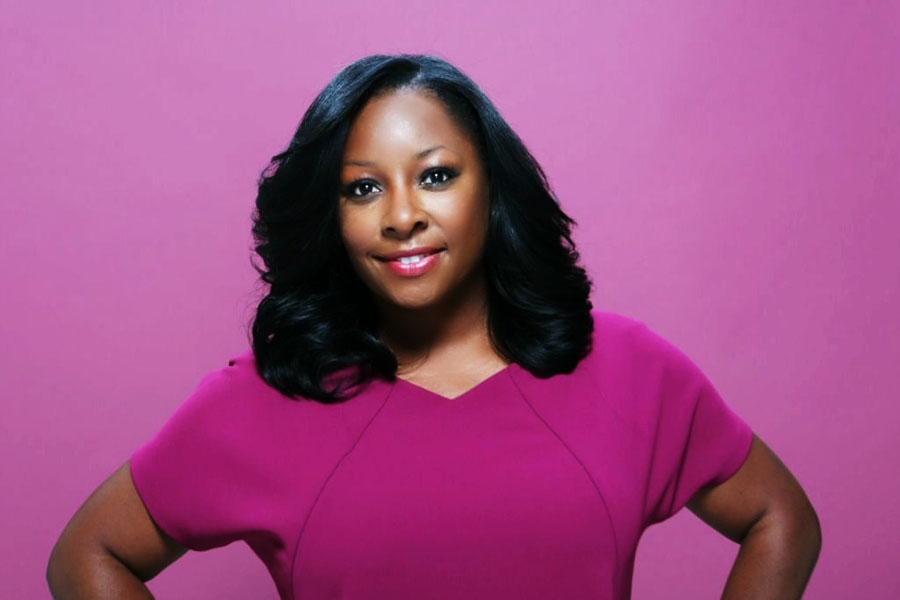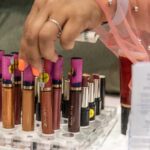A Q&A with Paula Hayes, founder and CEO of Hue Noir Cosmetics.
Chemist Paula Hayes started Hue Noir in 2009 as a small endeavor in her kitchen. Around 2013, she decided it was time to mature out of hobby status and into full-fledged business mode. Since then, the Beaverton-based company, which employs six and makes cosmetics for women with dark skin tones, has been on a strong growth track.
Revenues have doubled in the past few years, and Hue Noir’s geographic representation and recognition in the beauty industry has spread. We caught up with Hayes, 48, the week after Hue Noir products started showing up in Target stores around the country. (Interview excerpts have been edited for brevity and length.)
OB: What is driving growth?
PH: Internal and external forces. Back in 2015 and 2016 I started getting very specific feedback from retailers, who saw a real potential from my company but said there would have to be some branding initiatives we would have to take on. We went through a complete brand elevation exercise, from how we communicate to consumers, to our content. So 2016 was revamping all of that. It was an arduous process, but we came out in 2017 so much stronger and saw things move on retail side.
Externally, when I was initially introducing the brand to retailers, I found myself trying to explain the why. But in recent years, with the beauty industry taking a hard look at diversity, coupled with Rhianna launching a brand that had more diversity of tone, the market is seeing how receptive consumers are to that. My trade shows, my talks, have gotten a whole lot easier. I haven’t had to explain the why.
O.B.: Where does your funding come from?
P.H.: Bootstrapping. I have a couple of private angel investors, and then I’ve been fortunate to have a great relationship with Elevate Capital. [Managing director] Nitin Rai has been a great guide and mentor. They made the investment that helped me finish out the branding.
OB: How has your marketing strategy evolved?
P.H.: My strategy early on was to go into the smaller boutique salon route; there was the idea of wanting me to get in to retailers. I started with small boutiques catering to a very specific marketplace, but then brought on sales and marketing firm called MV Roberts. So we’re now looking at larger boutique accounts that have 40-70 locations.
We also secured an account with Target; we launched Target online last month. This past Sunday we launched in 102 retailers from Target. That obviously goes a long way for us.
OB: Are you in Oregon Target outlets?
P.H.: Not in Oregon. I think Oregon is not as diverse as other markets; we’re in Atlanta, Brooklyn, Maryland, a couple of California locations. As [Target] was looking at locations, looking at diversity and strong median income, and unfortunately Oregon didn’t make it.
O.B.: What decisions guide new product development?
P.H.: The biggest product introduced last year was our foundation. I’ve been working on that formula for two years, and wanted to wait for launch in 2017. That’s the product that got picked up by Target. A lot of the retailers I’ve been speaking to say there are a lot of companies coming out with lipsticks, but no one is really tackling the foundation market.
O.B. You are a chemist and an entrepreneur. How do you balance the two?
P.H.: It’s an interesting balance, and it’s getting a little tougher. Earlier on I felt it was important to wear chemist hat. I specialized in product development. I felt really strongly about using those skills to tackle a problem I had. When I was working as an R&D chemist [for American Fruits Processors, since acquired by Monster Beverage Company], they agreed to pay me for an MBA. So I rolled in the University of Phoenix — going to school at night while working. Then they started to train me across the business. It was the best training I could have gotten.
As we’ve grown, I’m pulled away from research and development more than I personally like. I’ve had to bring in resources to help me bridge the gap. I can’t always be back researching, and I can’t always been on business side. There will come a day when I will have another full time product development chemist.
O.B. You started this company because you couldn’t find any products you liked. Tell us more about that.
P.H.: My challenge was two fold; if I found products that worked from a darker skin tone from a color skin point, I inevitably ended up with some sort of skin issue. So I started to stay away from certain products. The products that worked from me more from a health standpoint often didn’t have the color I needed. That was kind of the catalyst to make my own products. I knew that was a need for a lot of women that looked like me. If you look at my lipsticks, my background philosophy is it needs to feel as good at it looks and have benefits beyond color.
O.B.: It’s 2018. Are surprised that this market, cosmetics for women of color, is just getting off the ground?
P.H.: Honestly, I always thought there would be other companies that would outpace me and beat me to this. My hesitation was that someone else would be doing it. I understand is t to understand how difficult it was. I think it was hard for some of those voices to come through in the marketplace; there’s a little bit of lack of investment in the area. If the established companies aren’t necessarily ideating in this area, they are waiting for smaller companies to ideate and do a buyout. There are a lot of things going on that made it difficult for voices to break through.
O.B.: Are you open to a buyout?
P.H.: I’m potentially open to a buyout. I’ve always been open to the idea of a company much larger than Hue Noir to help us with our objective, which is to become a global brand.





